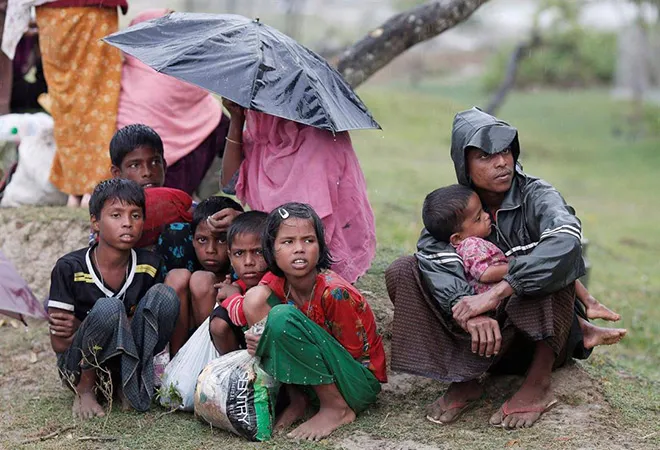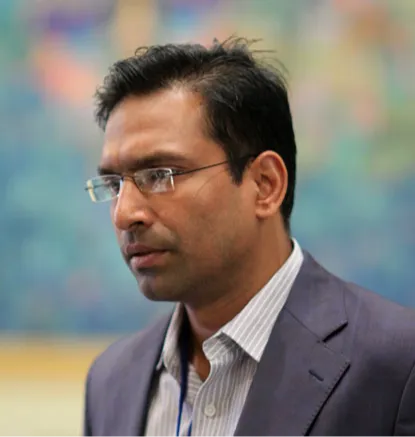-
CENTRES
Progammes & Centres
Location

India’s eastern neighborhood is experiencing an enormous humanitarian catastrophe. Since late August 2017, over half a million Rohingya refugees from Myanmar’s restive Rakhine State have fled to neighboring Bangladesh. Sectarian riots in Myanmar involving Rohingya Muslims and Rakhine Buddhists, as well as unrelenting state-sponsored violence targeting the Rohingya minority, have invited widespread global condemnation and calls for urgent humanitarian interventions.
While the international response in general appears to be tentative and evolving, India’s muted reaction is of particular note. Given the country’s democratic credentials, long humanitarian record, and leverage over both the Burmese and Bangladeshi regimes, regional and global expectations were high that India would help diffuse this state-orchestrated humanitarian crisis. However, India has floundered. Its Home Affairs Ministry declared the Rohingya to be “illegal immigrants” and ordered their deportation from India in early August. India’s response lacks the empathy and humanitarianism that the country is known for. Instead, a cold calculation of strategic interests seems to be guiding its response. This augurs ill for India’s attempted positioning as a rising, pro-democracy international power.
The Causes of the Exodus
The Rohingya are one of the most persecuted minorities in the world. Their status in Myanmar is fragile; at 1.1 million, they constitute about 2 percent of the population. Currently, the Myanmar government allows Rohingya civilians to register as temporary residents with identification cards. While the Rohingya had been allowed to vote and stand for parliamentary elections in 2012, the Myanmar state chose to disenfranchise the Rohingya community in the 2015 national election, after heavy pressure from hardline Buddhists.
While the Rohingya have been subjected to both violent attacks from the army and sectarian pressure from Buddhist vigilantes since the 1970s, the situation has escalated to an unprecedented level in the last few years.
According to Human Rights Watch, the state-sponsored violence forced a full 125,000 Rohingya persons to leave their homes and live in squalid refugee camps in Rakhine State in 2012. When a new Rohingya militant group, the Arakan Rohingya Salvation Army (ARSA), attacked army outposts in October 2016, state-enforced violence took on even greater ferocity. A brutal crackdown by the Burmese army caused many deaths and forced more than 75,000 Rohingya migrants to cross over to Bangladesh, with hundreds of them dying in transit.
Having been disowned by their own country, the Rohingya found no takers in the neighborhood. For instance, Bangladesh, while now providing temporary shelter to more than half a million of them, had strongly resisted their entry in previous decades. Similarly, Thailand and Malaysia had earlier put up strong resistance, holding boats carrying Rohingya refugeesat gunpoint. Despite being a Muslim country, Indonesia has turned away migrant boats on numerous occasions. In short, the Rohingya are stateless and the most shunned community in the region.
While Myanmar’s government has claimed 400 deaths, independent research by the United Nations and human rights activists estimate a death toll exceeding 1,000 since the August 25 militant attacks on the Burmese army. The UN High Commissioner for Human Rights termed the Rohingya situation “deplorable” and noted that the Rakhine case was a “textbook example of ethnic cleansing.” The ongoing violence, and the state-led campaign intended to push out a vulnerable minority, is justifiably being condemned worldwide by major nations, multilateral bodies, and regional organizations. Responding to the growing humanitarian crisis, the UN Human Rights Council (UNHRC) introduced a resolution and has appointed a committee to investigate the violation of human rights in Rakhine.
Notwithstanding the growing international pressure, Myanmar’s democratically elected government, under the iconic Aung San Suu Kyi, has been broadly supportive of the military’s actions.
Under mounting pressure and in response to widespread global condemnation, Suu Kyi—who previously set up a commission headed by former UN secretary general Kofi Annan to suggest measures to benefit the Rohingya—has promised to take back Rohingya refugees. What has surprised most world leaders and analysts was not only her failure to condemn army excesses, but her refusal to even utter the word Rohingya. With the army holding veto power over security and the country dominated by hardline Buddhist nationalists, it is an open question whether the Rohingya will ever safely go back to their homes.
India's Regional Reaction
At home and abroad, there have been loud calls for India, the region’s dominant power and a country with a long history of providing humanitarian assistance to its neighbors, to play a proactive role in the crisis. India has strong influence in both Myanmar and Bangladesh, and could make a real difference.
However, New Delhi has not risen to the occasion in the evolving humanitarian tragedy. Far from being supportive or sensitive to the plight of the Rohingya, the government of Prime Minister Narendra Modi labeled them as illegal migrants who require deportation. India’s Home Affairs Ministry has issued instructions to concerned states to identify illegal Rohingya and repatriate them to Myanmar.
In addition, the government has filed a counter petition before the Indian Supreme Court declaring the Rohingya to be both illegal migrants and a threat to national security.
An even bigger shock came when the Indian prime minister visited Myanmar in September. At his joint press conference with Suu Kyi, Modi said, “We are partners in your concerns over the loss of lives of security forces and innocent people due to the extremist violence in Rakhine State.” Not only did he avoid using the word Rohingya, possibly at the behest of his host, but Modi did not even make a passing mention of the state’s persecution and ongoing displacement of the Rohingya. The only saving grace was the announcement of development aid, including reconstruction programs within Rakhine State, which would be beneficial for the Rohingya.
India did make some marginal adjustments to its approach after Bangladesh made its displeasure known. It devised a face-saving program called Operation Insaniyat, offering material aid to Rohingya refugees in Bangladesh.
In another step to undo the damage, India chose not to disassociate from a UNHRC resolution, which mandated a probe into crimes by Burmese security forces. Considering the Indian prime minister’s stance at Naypyidaw, this revised position at the UNHRC indicates a notable shift.
Three factors have driven the government’s controversial stance. The first is growing security concerns over global jihadi groups such as the self-proclaimed Islamic State and al-Qaeda, and the actions of Pakistan’s Inter-Services Intelligence (ISI) promoting the rise of ARSA as a new terrorism machine. These developments have made the pro-Hindutva regime in New Delhi wary of the potentially wider security ramifications of the conflict in Myanmar. With intelligence agencies warning of serious emerging threats, and the Pakistan-based terrorist outfit Lashkar-e-Taiba desperately seeking to arm the Indian Rohingya, New Delhi feels it would be a security risk to have more Rohingya refugees in its territory.
Second, Myanmar remains India’s gateway to Southeast Asia, so its cooperation crucial is for New Delhi’s broader regional objectives. India’s strong backing of the current regime in Myanmar, and its reluctance to openly condemn “excessive counterinsurgency measures” following the militant attacks, are linked to the Burmese government’s role in both quelling insurgencies in northeastern India and assisting India’s Act East policy.
Third, China’s overwhelming presence in Myanmar continues to guide India’s dealings with the Burmese authorities. India’s strong stance against the military’s suppression of Burmese democratic movements in the 1980s pushed the junta into China’s arms. India now wants to avoid a repeat of this. With China strongly backing both the military and Suu Kyi’s government on their Rakhine policy, India perceives that geopolitically it has little choice but also to stand by the regime.
In short, New Delhi’s response appears to be guided by a cold cost-benefit calculation concerning trade with Myanmar, maintaining its leverage vis-à-vis China, and safeguarding cooperation on counterinsurgency operations in its northeast.
Is India doing enough?
Obviously, each nation has the right to act in its own self-interest to defend vital national objectives, including security and geopolitical advantages. Yet, if they want to be responsible stakeholders of international order and global governance, nations should maintain a healthy balance between interests and values. Being both a close neighbor to Myanmar and a responsible regional actor, India could and should play a more balanced role and take on a greater responsibility in preventing the violence from spiraling out of control, as well as proactively addressing refugee issues. India justifiably promotes its credentials as a democratic power—and this identity is a cornerstone of its geopolitical advantage in the region. Yet India’s stance on Rohingya refugees diminishes its democratic credentials and its proud humanitarian heritage.
Like many countries in the world, India does not have a perfectly consistent record on humanitarian crises and refugee issues, yet at no point in its independent history has it ever shut the door to refugees fleeing from conflict zones, particularly in its close neighborhood. Despite not being a signatory to the 1951 Refugee Convention, India has an admirable record in accommodating refugees from Bangladesh, Sri Lanka, Tibet, and even Afghanistan. And India was able to shoulder these burdens when the country was poorer and considerably weaker than it is today. Furthermore, India’s founding fathers are on record as advocating a post-sovereignty philosophy, and they evinced strong interest in the UN and human rights institutions.
Even with regard to the Rohingya, New Delhi sheltered several thousand as recently as 2012. Then foreign minister Salman Khurshid paid a visit to Rakhine and announced economic aid to the tune of $1 million.
So why has there been such a sudden U-turn? Many suspect that the hardening of the government’s policy on the Rohingya is in conformity with the Modi government’s hostile stance toward minorities, particularly Muslims. This trend is reflected in the proposed 2016 Citizenship Amendment Bill—New Delhi’s recent announcement to recognize non-Muslim refugees, including ethnic Chakmas (those of Buddhist origin), as Indian citizens
India’s muted response to the Rohingya crisis, under the pretext of security and geopolitics, cuts against its own global ambitions. Offering limited material assistance to Bangladesh, which one analyst called “a few sacks of rice,” cannot substitute for a more proactive response. Its calculated and tactless reaction to a humanitarian catastrophe in its own neighborhood paints the country in a poor light, diminishing the moral halo of an ancient civilization and devaluing its long history of humanitarianism. Importantly, such a stance actually undermines India’s ability to stand distinct from China and fosters serious doubts among its neighbors concerning India’s commitment to democratic and humanitarian values. While India has to tread cautiously given growing radicalization within the Rohingya community, and the related efforts of the Islamic State and other Islamic jihadists, a great democratic power surely cannot passively watch a humanitarian catastrophe unfold on its doorstep.
Notes
In 1978, Bangladesh strongly opposed the exodus of Rohingya to Chittagong District. Bangladeshi border guards forcibly stopped their entry during the 2012 exodus. See “Burmese Refugees in Bangladesh: Still No Durable Solution,” Human Rights Watch, May 1, 2000, https://www.hrw.org/report/2000/05/01/burmese-refugees-bangladesh/still-no-durable-solution.
This commentary originally appeared in Carnegie Endowment for International Peace.
The views expressed above belong to the author(s). ORF research and analyses now available on Telegram! Click here to access our curated content — blogs, longforms and interviews.

Niranjan Sahoo, PhD, is a Senior Fellow with ORF’s Governance and Politics Initiative. With years of expertise in governance and public policy, he now anchors ...
Read More +